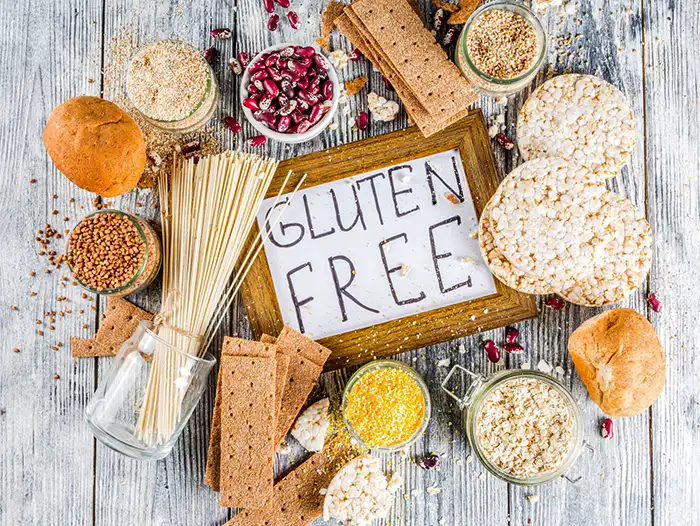What Does Gluten-Free Mean?
A gluten-free diet involves the exclusion of all foods containing gluten, a protein present in wheat, barley, rye, and triticale. This dietary approach is essential for individuals with celiac disease, who experience autoimmune damage in the small intestine when gluten is consumed. It also benefits those with non-celiac gluten sensitivity and gluten ataxia, by alleviating symptoms such as bloating, headaches, and neurological issues. Adopting a gluten-free lifestyle can be challenging due to hidden gluten in various products and potential nutritional gaps. To discover more, explore further insights and guidelines on managing this dietary change effectively.
Key Points
- Gluten-free means avoiding foods containing wheat, barley, rye, and triticale.
- It is essential for managing celiac disease, NCGS, gluten ataxia, and wheat allergies.
- Gluten-free diets eliminate gluten to prevent symptoms and promote healing.
- Essential to read labels carefully as gluten can be hidden in various products.
- Naturally gluten-free foods, like fruits and vegetables, are safe choices.
Understanding Gluten
Gluten is a protein found in wheat, barley, rye, and triticale, and is essential to understand for those managing gluten-related disorders.
Celiac disease, a prominent condition requiring a gluten-free diet, is an autoimmune disorder where ingesting gluten damages the small intestine lining. This damage impairs nutrient absorption, leading to various symptoms such as anemia, osteoporosis, and neurological issues.
Non-celiac gluten sensitivity (NCGS) presents with similar symptoms to celiac disease but does not cause intestinal damage. The exact immune system involvement in NCGS remains unclear, yet individuals experience significant relief upon eliminating gluten from their diet.
Gluten ataxia, another autoimmune disorder, affects nerve tissues and results in issues with muscle control and coordination. This condition necessitates strict adherence to a gluten-free diet to prevent further neurological damage.
Additionally, wheat allergy involves an immune response specifically to wheat proteins, manifesting through symptoms like hives, digestive issues, and in severe cases, anaphylaxis. Unlike celiac disease and gluten ataxia, wheat allergy management does not always require complete avoidance of all gluten-containing grains but does warrant careful dietary planning.
For all these conditions, consulting with healthcare professionals or dietitians is vital to maintain a balanced and safe diet.
Reasons to Avoid Gluten
For individuals with celiac disease or gluten sensitivity, the primary reason to avoid gluten is to prevent adverse health effects and alleviate symptoms.
Celiac disease is an autoimmune disorder where the ingestion of gluten leads to damage in the small intestine, impairing nutrient absorption and causing symptoms such as abdominal pain, diarrhea, and fatigue. Avoiding gluten is vital to prevent further intestinal damage and promote healing.
Non-celiac gluten sensitivity (NCGS) presents with symptoms similar to celiac disease, including bloating, headache, and joint pain, although without the intestinal damage associated with celiac disease. For these individuals, a gluten-free diet can greatly improve quality of life by reducing these symptoms.
Additionally, avoiding gluten is essential for managing gluten ataxia, a rare autoimmune condition affecting the nervous system, leading to problems with muscle coordination and balance. A strict gluten-free diet can help mitigate these neurological symptoms.
Gluten-Related Disorders
Understanding the various gluten-related disorders is crucial for identifying appropriate dietary and medical interventions. These disorders encompass a range of conditions triggered by gluten, a protein found in wheat, barley, rye, and triticale.
Celiac disease is an autoimmune disorder where ingestion of gluten leads to damage in the small intestine, impairing nutrient absorption and causing symptoms like diarrhea, abdominal pain, and anemia.
Non-celiac gluten sensitivity (NCGS) presents symptoms similar to celiac disease but lacks the intestinal damage, and the precise immune mechanisms remain unclear.
Gluten ataxia, another autoimmune condition, affects the nervous system, leading to coordination and muscle control issues.
Wheat allergy involves an allergic reaction to wheat proteins, resulting in symptoms like hives, respiratory issues, and, in severe cases, anaphylaxis.
Proper diagnosis and management of these conditions usually require collaboration with healthcare professionals, including dietitians, to guarantee a balanced diet while avoiding gluten.
Each of these disorders necessitates distinct dietary adjustments, emphasizing the importance of understanding the specific gluten-related condition at hand for effective treatment and improved quality of life.
Benefits of Gluten-Free Diet
Adopting a gluten-free diet offers significant health benefits for individuals diagnosed with gluten-related disorders, particularly improving symptoms and promoting intestinal healing in celiac disease patients. This dietary change can lead to the alleviation of chronic gastrointestinal issues such as abdominal pain, diarrhea, and bloating, which are common in celiac disease. Moreover, adherence to a gluten-free diet can facilitate the repair of the damaged intestinal lining, thereby enhancing nutrient absorption and overall digestive health.
For those with non-celiac gluten sensitivity (NCGS), eliminating gluten can also result in noticeable symptom relief. Such individuals often experience a reduction in headaches, fatigue, and joint pain, contributing to an overall improvement in quality of life. Additionally, for patients with gluten ataxia, a rare neurological condition, a gluten-free diet can mitigate symptoms related to muscle coordination and balance.
Beyond symptom relief, patients adhering to a gluten-free diet may experience secondary benefits, such as improved bone mineral density and enhanced energy levels due to better nutrient absorption.
However, it is vital for individuals to seek guidance from healthcare professionals to guarantee they maintain a balanced and nutritionally adequate diet while avoiding gluten.
Challenges of Going Gluten-Free
Steering the shift to a gluten-free diet can present significant challenges, from accurately identifying gluten-containing foods to ensuring nutritional adequacy. One of the primary obstacles is the meticulous scrutiny required of food labels. Gluten can be hidden in unexpected places, such as sauces, soups, and even medications, necessitating a vigilant approach to shopping and meal planning.
Moreover, maintaining a balanced diet without gluten can be difficult. Many gluten-free products lack essential nutrients found in fortified wheat-based foods, leading to potential deficiencies in fiber, iron, and B vitamins. This makes it vital for individuals to diversify their diet with naturally gluten-free and nutrient-dense alternatives.
Social and psychological challenges also emerge. Dining out, attending social events, and travel can become complex, requiring prior planning and communication to avoid gluten exposure.
Hidden Gluten Sources: Awareness is key to avoiding gluten in processed foods, medications, and supplements.
Nutritional Gaps: Ensuring sufficient intake of essential vitamins and minerals can be challenging without gluten-containing grains.
Social Impact: Maneuvering social settings and dining out necessitates extra effort and communication to maintain dietary restrictions.
Understanding these challenges is essential for anyone considering or currently adhering to a gluten-free lifestyle.
Tips for Gluten-Free Living
Maneuvering the complexities of a gluten-free lifestyle requires strategic approaches to guarantee both safety and nutritional balance.
Begin by meticulously reading food labels for hidden gluten ingredients such as barley malt and wheat derivatives. Opt for naturally gluten-free foods like fresh fruits, vegetables, and unprocessed meats to minimize risk. Cross-contamination is a significant concern, so maintain separate storage and preparation areas for gluten-free foods and use dedicated utensils and cookware.
Dining out necessitates advance planning. Research restaurant menus online and call ahead to confirm gluten-free options. Choosing less busy dining times can guarantee staff provide the necessary attention to your dietary needs.
Emphasize the importance of maintaining a balanced diet by incorporating gluten-free grains such as quinoa and brown rice, along with fortified gluten-free products to address potential nutrient deficiencies.
Furthermore, consulting with a registered dietitian can offer tailored advice and support. Regularly reassess your dietary regimen to guarantee it meets your evolving nutritional requirements.
Frequently Asked Questions
How Does Gluten-Free Labeling Affect Alcoholic Beverages?
Gluten-free labeling in alcoholic beverages mandates that products must be made from gluten-free ingredients and disclose any potential gluten content uncertainty, ensuring compliance with FDA standards of containing less than 20 parts per million of gluten.
Are Medications and Supplements Gluten-Free?
Medications and supplements are not inherently gluten-free. Gluten may be used as a binding agent. Patients should consult healthcare providers or pharmacists and carefully read labels to guarantee products are safe for gluten-sensitive individuals.
What Are Common Sources of Gluten in Processed Foods?
Common sources of gluten in processed foods include wheat, barley, and rye. Wheat gluten is frequently used as a thickening or binding agent, and also for flavoring or coloring, necessitating careful label reading for gluten presence.
How Do I Avoid Cross-Contamination in a Shared Kitchen?
In the grand theater of shared kitchens, avoiding cross-contamination requires separate storage, meticulous sanitization of cooking surfaces, and distinct utensils for gluten-free foods. Engaging in these practices guarantees a safe culinary experience for all.
Can Non-Food Products Contain Gluten?
Yes, non-food products such as medications, supplements, and cosmetics can contain gluten. It is essential to check labels and consult healthcare providers to guarantee these products do not pose a risk to gluten-sensitive individuals.




